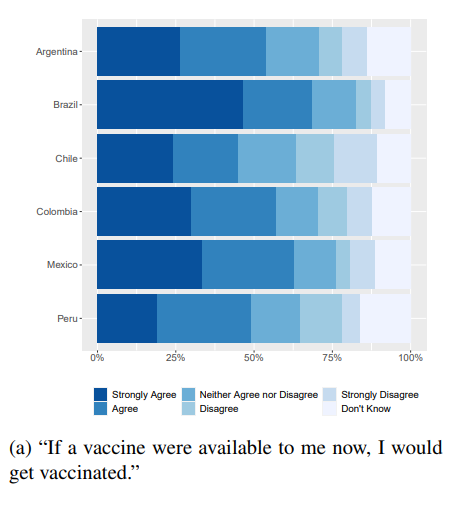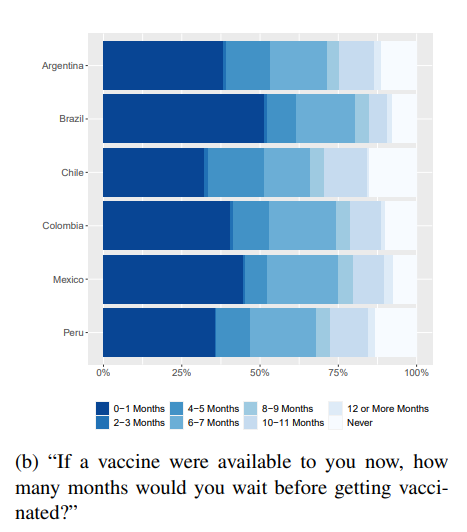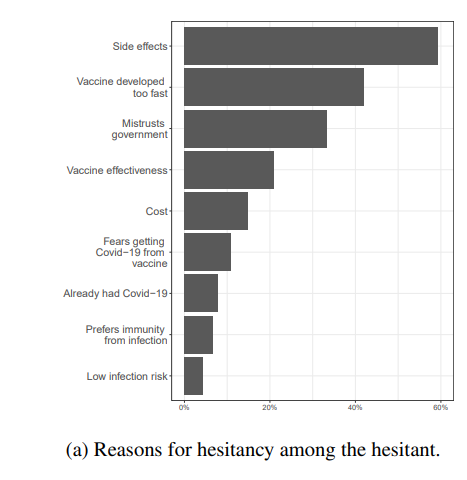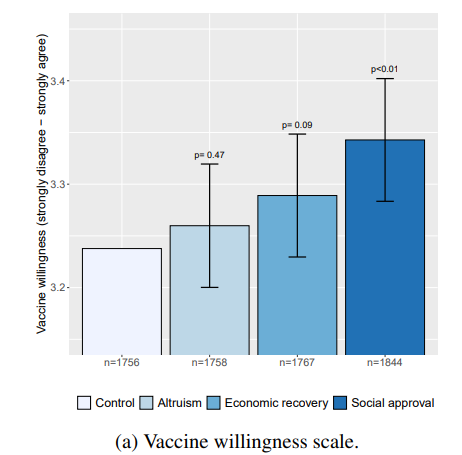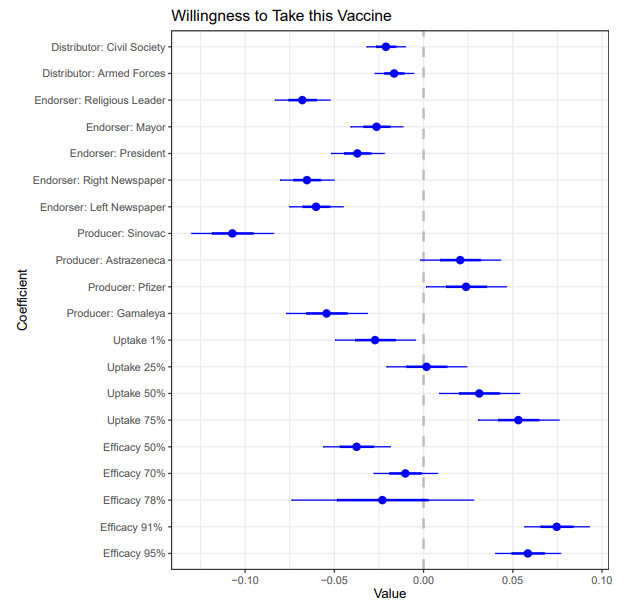What can we do to reduce vaccine hesitancy?
To find out, with @PabloArgoteT @elena_barham @sarahzdaly @JulianEGerez and John Marshall, we carried out a series of survey experiments on vaccine hesitant respondents in 6 Latin American countries https://abs.twimg.com/emoji/v2/... draggable="false" alt="🇦🇷" title="Flagge von Argentinien" aria-label="Emoji: Flagge von Argentinien">
https://abs.twimg.com/emoji/v2/... draggable="false" alt="🇦🇷" title="Flagge von Argentinien" aria-label="Emoji: Flagge von Argentinien"> https://abs.twimg.com/emoji/v2/... draggable="false" alt="🇧🇷" title="Flagge von Brasilien" aria-label="Emoji: Flagge von Brasilien">
https://abs.twimg.com/emoji/v2/... draggable="false" alt="🇧🇷" title="Flagge von Brasilien" aria-label="Emoji: Flagge von Brasilien"> https://abs.twimg.com/emoji/v2/... draggable="false" alt="🇨🇱" title="Flagge von Chile" aria-label="Emoji: Flagge von Chile">
https://abs.twimg.com/emoji/v2/... draggable="false" alt="🇨🇱" title="Flagge von Chile" aria-label="Emoji: Flagge von Chile"> https://abs.twimg.com/emoji/v2/... draggable="false" alt="🇨🇴" title="Flagge von Kolumbien" aria-label="Emoji: Flagge von Kolumbien">
https://abs.twimg.com/emoji/v2/... draggable="false" alt="🇨🇴" title="Flagge von Kolumbien" aria-label="Emoji: Flagge von Kolumbien"> https://abs.twimg.com/emoji/v2/... draggable="false" alt="🇲🇽" title="Flagge von Mexiko" aria-label="Emoji: Flagge von Mexiko">
https://abs.twimg.com/emoji/v2/... draggable="false" alt="🇲🇽" title="Flagge von Mexiko" aria-label="Emoji: Flagge von Mexiko"> https://abs.twimg.com/emoji/v2/... draggable="false" alt="🇵🇪" title="Flagge von Peru" aria-label="Emoji: Flagge von Peru">
https://abs.twimg.com/emoji/v2/... draggable="false" alt="🇵🇪" title="Flagge von Peru" aria-label="Emoji: Flagge von Peru">
To find out, with @PabloArgoteT @elena_barham @sarahzdaly @JulianEGerez and John Marshall, we carried out a series of survey experiments on vaccine hesitant respondents in 6 Latin American countries
TL;DR: basic vaccine facts, emphasizing the social approval benefits of vaccination and the feeling that herd immunity is within reach, and endorsements by trusted figures reduce hesitancy and the time people would wait to get vaccinated, helping us reach herd immunity faster!
As it stands, herd immunity might be out of reach: only 59% of our full sample agreed or strongly agreed to get vaccinated once a vaccine was available to them and the average respondent would wait 4.3 months before getting vaccinated.
After gauging for overall vaccine hesitancy, only hesitant individuals proceeded with the survey. We then conducted a series of experiments to determine how to reduce hesitancy among this crucial group, who cite the following reasons for their hesitancy:
We find that basic vaccine information (effectiveness rates, production and approval process, side effects) can reduce hesitancy: the information we provided convinced 8% of hesitant individuals to accept the vaccine and to get it more quickly.
Beyond information, appealing to the social approval benefits of getting vaccinated also increases vaccine willingness, more so than appealing to economic or altruistic benefits of vaccination.
We find no evidence of “free-riding” on others’ vaccinations and that respondents are more willing to get vaccinated if the goal of herd immunity seems within reach: people want to be part of a successful collective effort.
Features of vaccination campaigns also affect hesitancy: respondents are more likely to agree to vaccination if the vaccine is endorsed by a medical expert and if it& #39;s a US/UK-made vaccine (but information about efficacy reduces this bias against Russian and Chinese vaccines)
We find different effects on endorsements based on pre-existing levels of trust among respondents. For example, those who reported to be more trusting of the Chinese government were more willing to accept a hypothetical Chinese vaccine.
Similarly, among Evangelicals, an endorsement by an Evangelical pastor helps reduce hesitancy, indicating that religious leaders can be important players in communication campaigns. See: https://twitter.com/elena_barham/status/1379162555134926857">https://twitter.com/elena_bar...
So what can governments do to reduce vaccine hesitancy?
 https://abs.twimg.com/emoji/v2/... draggable="false" alt="⏩" title="Nach rechts zeigendes doppeltes Dreieck" aria-label="Emoji: Nach rechts zeigendes doppeltes Dreieck">Give basic vaccine facts from trusted sources
https://abs.twimg.com/emoji/v2/... draggable="false" alt="⏩" title="Nach rechts zeigendes doppeltes Dreieck" aria-label="Emoji: Nach rechts zeigendes doppeltes Dreieck">Give basic vaccine facts from trusted sources
 https://abs.twimg.com/emoji/v2/... draggable="false" alt="⏩" title="Nach rechts zeigendes doppeltes Dreieck" aria-label="Emoji: Nach rechts zeigendes doppeltes Dreieck">Make vaccine uptake more observable (& #39;I got vaccinated& #39; stickers/wristbands)
https://abs.twimg.com/emoji/v2/... draggable="false" alt="⏩" title="Nach rechts zeigendes doppeltes Dreieck" aria-label="Emoji: Nach rechts zeigendes doppeltes Dreieck">Make vaccine uptake more observable (& #39;I got vaccinated& #39; stickers/wristbands)
 https://abs.twimg.com/emoji/v2/... draggable="false" alt="⏩" title="Nach rechts zeigendes doppeltes Dreieck" aria-label="Emoji: Nach rechts zeigendes doppeltes Dreieck">Upbeat communication about reaching herd immunity as a team effort (instead of fearmongering)
https://abs.twimg.com/emoji/v2/... draggable="false" alt="⏩" title="Nach rechts zeigendes doppeltes Dreieck" aria-label="Emoji: Nach rechts zeigendes doppeltes Dreieck">Upbeat communication about reaching herd immunity as a team effort (instead of fearmongering)
To learn more, the full papers can be found here: https://papers.ssrn.com/sol3/papers.cfm?abstract_id=3812023">https://papers.ssrn.com/sol3/pape...
and here https://scholar.harvard.edu/files/jmarshall/files/vaccines_hesitancy_paper_2.pdf.">https://scholar.harvard.edu/files/jma...
and here https://scholar.harvard.edu/files/jmarshall/files/vaccines_hesitancy_paper_2.pdf.">https://scholar.harvard.edu/files/jma...

 Read on Twitter
Read on Twitter